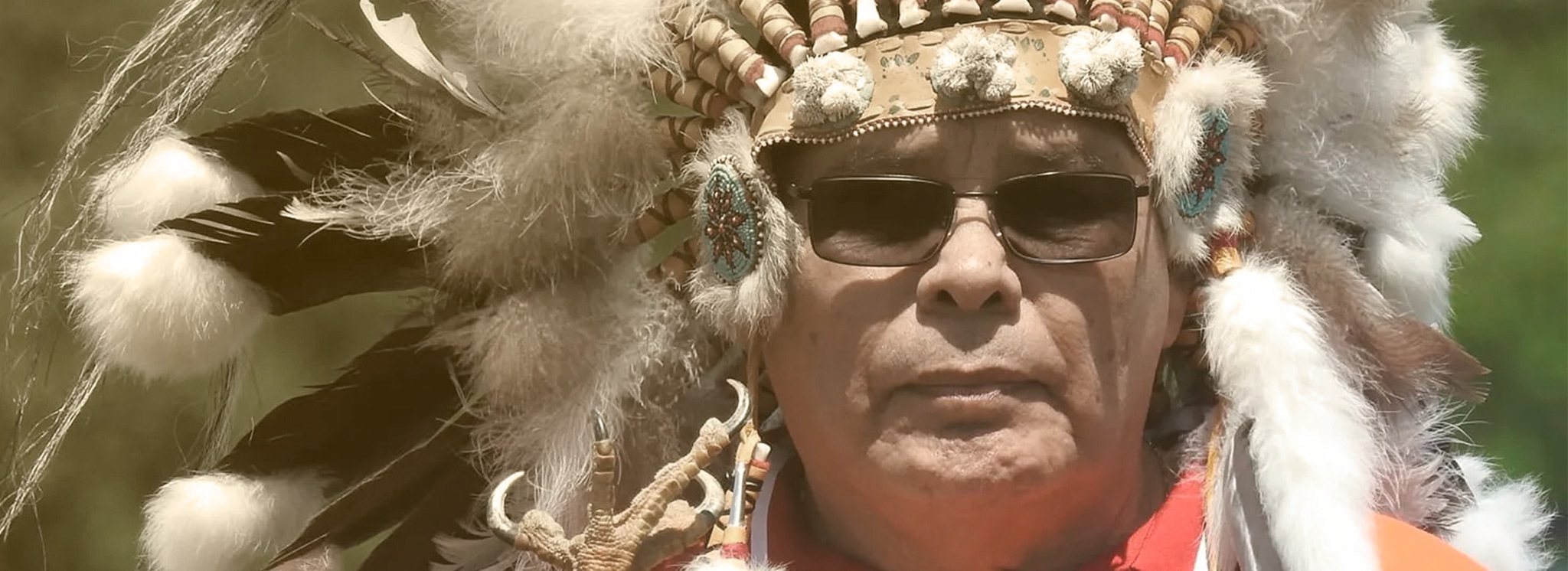By Dillon Collins
Respect, as with most meaningful things in life, is earned, not given. Few in this province have earned the adoration and unbridled respect as has Chief Mi’sel Joe, the longtime hereditary Saqamaw, Administrative Chief and spiritual leader of Miawpukek First Nation.
Chief Joe lived, and continues to live, a life dedicated to community service. Stepping down from his role of Administrative Chief in January 2024, the soon-to-be 77-year-old reflects on the winding journey during a candid one-on-one with Downhome.
“I think, during the last election, I debated whether I would run or not. And at the eleventh hour I decided I would do another two years,” he admits, delving into his recent decision to step away from administrative duties. “I’ll be 77 in June of this year. After having a good discussion with my family during Christmas when they were home, after Christmas I decided that, yeah, I would talk to counsel first and then go from there.”
He admits freely that the move came with no shortage of emotions.
“Oh, absolutely,” he says when asked whether or not his retirement came with mixed emotions. “They’ve been my other family for 30 years. The people sitting around the table, the counsillors, I watched them grow up. It was a heartful time to leave them. I know they’re in good hands, and I feel more like a grandfather leaving my kids now and somebody else is going to look after them.”
Chief Joe’s second life in leadership has endured for over five decades. He first entered community politics in 1974 as a councillor, and then as Hereditary Saqamaw of Miawpukek and the Newfoundland District Chief for the Mi’kmaq Grand Council following the death of his uncle, Chief William Joe, in 1982.
“My life has been here, working here and serving the people here in this community,” he shares, reflecting on his “trial by fire” beginning in the waning months of 1982.
“I was fairly close to my uncle. Every once in a while he would say to me, ‘You’re going to be the Chief’ and I’d say ‘Not for awhile I hope,’ but unfortunately he drowned in a car accident just before Christmas. I sort of jumped into the fire from there without really knowing what I was getting into. But I knew there was good staff that were already there that worked with him and would help me through this. And it was trial by fire, no doubt about it. Taking on the Peckford government was no mean feat at all.”
Chief Joe’s first months in office would bring him nose-to-nose with Newfoundland and Labrador’s third Premier, Brian Peckford. Issues arose surrounding federal money allocated for the Miawpukek community being withheld by the provincial government, who refused to release it without claiming $60,000 (of the $800,000 total), for administrative fees.
“The plan was to go after the Peckford government for funding that was outstanding for 13 months or something like that. Of course, some people in the meeting called me a damn fool and said ‘You’re crazy or you’re never going to get that. Your uncle couldn’t do it and the advisors he had with him couldn’t do it, so what makes you think you’re going to do it?’ And I think my response, if I remember correctly, might have been, ‘Well if we don’t try, we’ll never know,’” he shared of the turbulent period.
Making the trek to St. John’s and back with the promise of payments intact, Chief Joe and his companions made it to Gander, where it was confirmed that the agreed-upon payment had been cancelled.
Acting quickly, a group of more than 80 members of the community chartered a bus to St. John’s, occupying the offices of the Department of Rural, Agricultural and Northern Development at Atlantic Place. Over three dozen community members went inside the building and padlocked the door in an act of civil disobedience.
“The plan was to take on the government,” Chief Joe recollects, recounting the peaceful protest blow for blow. “We locked the doors with a chain and piled some furniture against it and waited for the police to show up, which we knew would happen. Now, we didn’t realize that it was going to happen in four hours, but we figured we’d be there at least three or four days negotiating. But four hours later the paddywagons showed up. I think the next day we all went to court and basically (were told) ‘Go home, be good Indians.’ And that was the turning point for us in many ways.”
Over two dozen protesters were arrested and subsequently released, but the move did nothing to dampen their resolve. Quite the opposite.
“If we had listened to the judge at that time and came home, I don’t think we would have gained any ground at all,” Chief Joe says, sharing that high-profile hunger strikes by the likes of Mahatma Gandhi and Bobby Sands inspired his next, more daring course of action.
“We had to do something that really brought the public into this and showed them what we’re going through, what we’re asking for. I knew there were going to be naysayers, and I certainly knew Peckford was going to be a devil to deal with,” he adds, explaining that he voiced to the community that “This is the only way I know how we can do civil disobedience our way. We’re not hurting anybody, we’re only offering ourselves. It was our life that we’re offering for the community.”
For nine days the nine men fasted, subsisting on only water and juice, standing their ground against the prospect of death by starvation, steadfast to their beliefs and demands to Peckford’s government.
“I was on the inside, fasting with everybody else, with negotiators outside dealing with the Peckford government,” he says, recounting one particularly ominous conversation. “I only found out later from Lorraine Michael that (the attending physician) was concerned and basically said to her that ‘Peckford is not going to move on this. He’s going to let those people die.’”
Thankfully, on the ninth day, an agreement was reached where funds would be released directly to the community, with no administrative costs attached. Reflecting on the dramatic and highly influential outcome, Chief Joe pauses.
“I remember being asked once, ‘Are you telling me that you’re hungry in Conne River, and that’s why you’re doing it?’ I said ‘We’re not hungry for food. We’re hungry for justice. And that’s why we’re doing this,’” he shares proudly.
It was a turning point. More changes would come and for the better. Miawpukek First Nation would be registered under the federal Indian Act, becoming part of the first reserve in Newfoundland and Labrador in 1987. Chief Joe would become the first Administrative Chief of the Miawpukek community when it adopted a dual-Chief system, complete with an election every two years, in 1988.
Reflecting on his life and legacy, no moment stands above the rest. It’s a body of work, of trials, struggles, successes and of a community in better shape at the end of his tenure.
“To be fair and honest, I’m humbled by it all,” he says. “Coming off of the heavy equipment that I used to do, leaving here at 16 and travelling across the country and seeing a lot of Aboriginal communities and meeting a lot of Aboriginal people in my short span, I’ve always thought about how nice it would be to be able to work from home, have our own school, send them off to university to do what other communities are doing. And we have that. People have worked here in this community, retired in this community and that humbles me. Everything that we’ve done humbles me. To me, it’s like a dream come true that did come true.
“When I think back on all those things, we’ve come a million miles in the right direction. How we managed to do that, I can’t tell you for sure. It’s like putting your hand inside a rattlesnake’s nest and hoping to God you don’t get bitten. You don’t know from day to day if the decisions being made are the right ones. Sometimes you have to make a lot of wrong ones to get to the right one. We were learning how to be a government, learning how to look after everyone who lives in the community. We did all those things and are still doing all those things.”
Don’t lament for Chief Joe as he steps back from public life. He’s still around, he cautions, staying active and involved in the community to which he’s dedicated over five decades of his life.
Coming full circle to the idea of respect, the point is once again hammered home that few in this province have done more to earn the respect of their peers and contemporaries asChief Mi’sel Joe. It’s an ethos he carries with him through each waking moment, of respect earned, and given, to everyone he meets.
“The key word is respect, respect for all people,” he says with a kind smile. “If you go pounding on some minister’s desk, cursing and swearing, you’re not going to get anywhere. We all know that. The only way to do that, to be number one, is to be respectful. If you can’t be respectful to yourself then you can’t be respectful to anyone else.”










